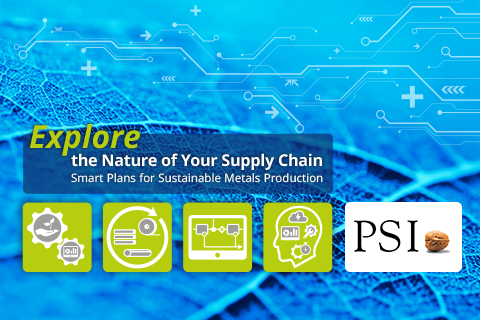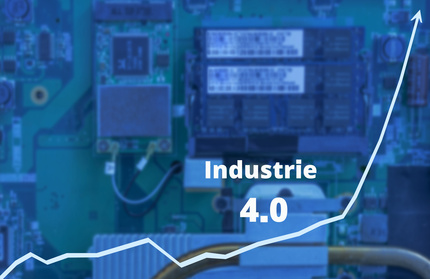Explore the Nature of Your Supply Chain - Smart Plans for Sustainable Metals Production
by Dagmar Dieterle

In the spirit of nature, everything is connected. Even unremarkable events can make a difference in this complex ecosystem - and in the best case, support the shift to a more sustainable world. Industrial manufacturers have recognized this and are now striving for smart and sustainable production. But it's not only about using the latest buzz-worthy technologies. It’s about creating a customer-centric, sustainable organization - a system in which a sustainable supply chain provides a competitive advantage. So leave the road, take the trails and join us in exploring the nature of your supply chain!
 Sustainability is not a buzzword – for 90 percent of the world, sustainability is a matter of survival. Climate change and population growth leave us no choice but to start adapting our resource use, investment policies and manufacturing practices today if we want to maintain a healthy and viable lifestyle. A lot of manufacturers, however, struggle to reach their ambitious green targets because arguably, sustainability is one of the most challenging areas for improvement. At the same time, a sustainable supply chain is a competitive advantage that makes manufacturers stand out from the rest.
Sustainability is not a buzzword – for 90 percent of the world, sustainability is a matter of survival. Climate change and population growth leave us no choice but to start adapting our resource use, investment policies and manufacturing practices today if we want to maintain a healthy and viable lifestyle. A lot of manufacturers, however, struggle to reach their ambitious green targets because arguably, sustainability is one of the most challenging areas for improvement. At the same time, a sustainable supply chain is a competitive advantage that makes manufacturers stand out from the rest.
What Does It Mean for Metal Producers?
When you think about sustainable manufacturing, probably the first thing that comes to your mind is environmental protection, especially reducing the carbon footprint. And indeed, amortizing CO2 emissions and complying with relevant regulations is one of the biggest challenges for metal producers.
But sustainable development also includes economic and social responsibility, for example, promoting health and safety, workforce training, green innovation and investment, responsible sourcing, transparency and disclosure among value chain partners, ethical governance, to name a few. Recently, the United Nations has issued a list of 17 interlinked sustainable development goals for 2030 and major steel and aluminum associations worldwide are already tracking sustainability performance indicators and engaging their members around a common vision of sustainable development.
As you can see, it is far from being just about one organism, it is about the entire ecosystem!
Sustainable Supply Chain: From ‘Take-Make-Waste’ to ‘Reuse, Reduce, Recycle & Redesign’
 At the heart of sustainable production, of course, must be a sustainable end-to-end supply chain. During their lifecycle, metal raw materials and products go through a variety of processes. Each of these processes consumes additional material and energy resources as inputs and generates potential waste as outputs. Here manufacturers need to go beyond existing lean and green practices like reducing, reusing and recycling – it is also essential to (re)design such processes to minimize resource consumption and waste generation.
At the heart of sustainable production, of course, must be a sustainable end-to-end supply chain. During their lifecycle, metal raw materials and products go through a variety of processes. Each of these processes consumes additional material and energy resources as inputs and generates potential waste as outputs. Here manufacturers need to go beyond existing lean and green practices like reducing, reusing and recycling – it is also essential to (re)design such processes to minimize resource consumption and waste generation.
However, it is equally important to implement best practices for green supply chain management that monitor sustainability performance through specific KPIs and metrics and optimize material flows, information exchange and business processes in a way that minimizes the environmental impact of production and logistics activities. This is where smart production planning software and practices make the difference!
Evolution 4.0: Smart Production Planning
 A smart system is one that makes intelligent decisions – that is, equivalent decisions that an experienced human agent would make in the same context. A smart planning system should therefore make decisions that are at least as good as those made by an experienced human planner. Artificial Intelligence (AI) has been successfully used for decades as part of Advanced Planning and Scheduling (APS) tools.
A smart system is one that makes intelligent decisions – that is, equivalent decisions that an experienced human agent would make in the same context. A smart planning system should therefore make decisions that are at least as good as those made by an experienced human planner. Artificial Intelligence (AI) has been successfully used for decades as part of Advanced Planning and Scheduling (APS) tools.
Like evolution, digital transformation is about looking forward – with its ongoing technological disruption, it takes smartness to a new level!
At the heart of the evolution 4.0 is essentially new technology that makes it possible to collect, share and process any kind of information and data in real time and across the entire supply chain.
Ensuring Transparency and Flexibility Through a Digital Ecosystem
Early AI was mainly based on logic – we were making computers and developing systems that reason like people. The second route is from biology – we are developing holistic solutions that can perceive and act and adapt like animals. In particular, the expanded availability of large data sets (Big Data) and computing power makes it possible to complement the model-driven AI engines already present in APS systems with new, data-driven AI techniques such as Machine Learning, Deep Learning, or neural network algorithms.
 The key advantage of this new generation of AI methods is that they offer the ability to train autonomous decision-making agents that can learn on their own, adapt themselves, and make real-time predictions based on the data they collect.
The key advantage of this new generation of AI methods is that they offer the ability to train autonomous decision-making agents that can learn on their own, adapt themselves, and make real-time predictions based on the data they collect.
In addition, the emergence of platforms and software-as-a-service technologies enables the integration of all relevant data and systems of supply chain partners into a single digital ecosystem. This enables transparent collaboration between multiple autonomous planning agents and the orchestration of flexible and adaptive business process flows. Last but not least, moving technology to the cloud is expected to bring savings in server power consumption.
Given these additional benefits in terms of smartness, speed and collaboration, it goes without saying that embracing the digital revolution goes hand in hand with improving the sustainability of the supply chain for metal manufacturers.
Do you want to know how PSImetals Planning can help you improve your supply chain sustainability?
Leave the road, take the trails and join us in exploring the nature of your supply chain! Follow our “Explore the Nature of Your Supply Chain - Smart Plans for Sustainable Metals Production” campaign, which is enriched with many exciting blog articles and exclusive webinars!
photos: PSI Metals and fotolia

